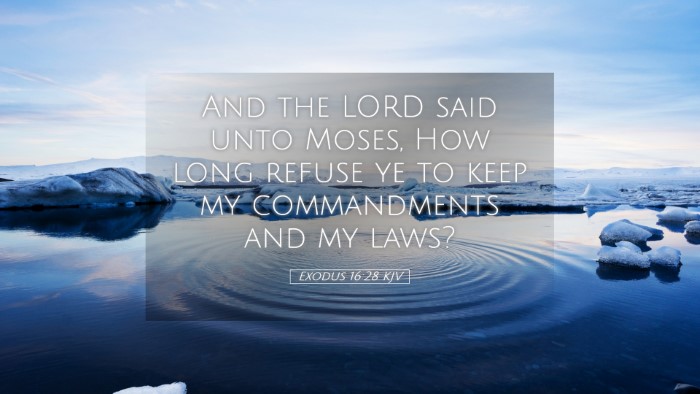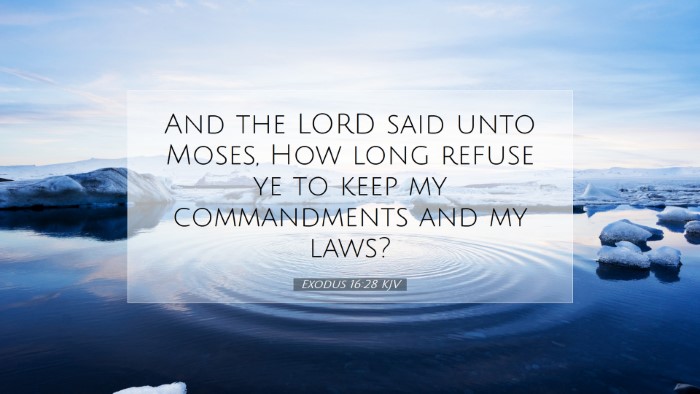Commentary on Exodus 16:28
Exodus 16:28 provides a unique glimpse into the covenant relationship between God and the people of Israel during their wanderings in the wilderness. The verse states:
“Then the Lord said to Moses, ‘How long will you refuse to keep my commands and my instructions?’” (Exodus 16:28, NIV)
Contextual Background
In the preparation for their exodus from Egypt, God provided the Israelites with miraculous sustenance in the form of manna, revealing His faithfulness and care. However, as passages surrounding this verse indicate, the people struggled with obedience and faith.
Theological Implications
- Covenantal Obedience: This verse emphasizes God's call for His people to obey His commands. The repeated calls for obedience throughout scripture reflect the seriousness of divine expectations.
- Testing of Faith: God's inquiry to Moses reveals a deeper significance concerning the character of the Israelites. Their reluctance to observe God's commandments served as a test of faith and relationship with their Creator.
- Divine Authority: The direct address from God to Moses highlights the authority of God within the community of Israel, establishing Moses not merely as a leader but as a mediator of God’s will.
Insights from Matthew Henry
In his exploration, Matthew Henry points to the human tendency to neglect God's directives. He notes:
“This passage bids us to remember that neglect of God’s commands is a common fault among His people.”
Henry further emphasizes that God’s question serves not only as a reprimand but also as a reminder of the dire consequences of disobedience, urging the community to reflect on their spiritual state.
Albert Barnes’ Perspective
Albert Barnes presents a detailed analysis of the circumstances surrounding this inquiry.
“Here the Lord forbearingly engages Moses in the conversation, not only to question the people's disobedience but to lead them to thoughtful repentance.”
Barnes discusses how such moments in scripture call for self-examination among believers and provoke a response of humility and commitment to God’s commands.
Adam Clarke’s Contributions
Adam Clarke identifies the significance of God's commands and the human inclination to disregard them.
“The Israelites, amidst their trials, needed to understand the importance of adhering to divine instruction, not as mere rules but as the foundation of their covenant relationship.”
Clarke emphasizes the moral lessons of reliance on God’s provisions, illustrating how obedience to the Lord reflects trust in His character and promises.
Practical Application for Today’s Believers
The themes drawn from Exodus 16:28 remain highly relevant for contemporary Christians. The urgent question posed by God can provoke profound self-reflection:
- How do we respond to God’s commands in our daily lives?
- Are we willing to examine our own hearts in light of our obedience to God’s word?
- To what extent do we recognize the importance of God's provisions and instructions?
Conclusion
Exodus 16:28 functions as a pivotal reminder of God's ongoing desire for relationship, rooted in obedience and trust. Drawing insights from historical commentaries provides a broader theological understanding that enriches one’s faith. As pastors, students, and scholars delve into this passage, they are encouraged to examine their personal commitments to God’s commands and ways in which they may live out those truths in their communities.


